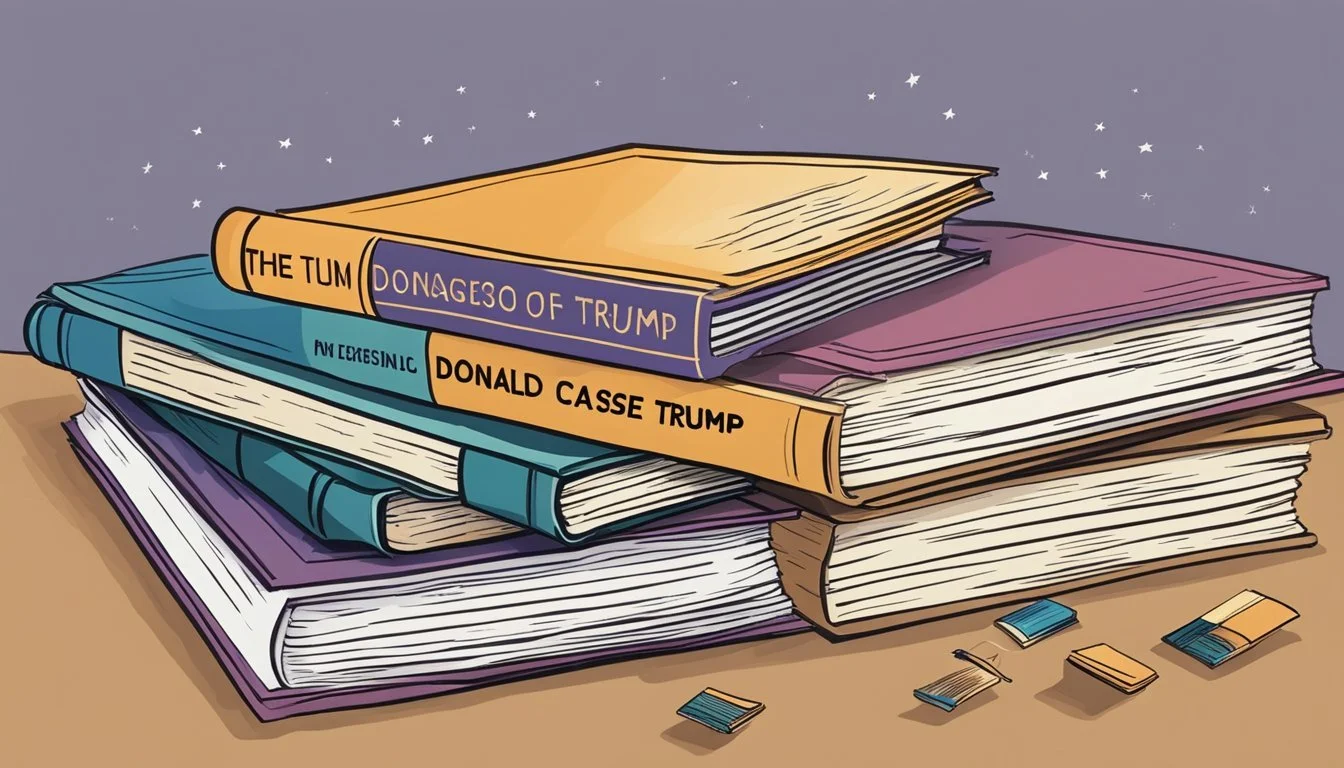The OCD President: Donald Trump's Possible Mental Health Struggles
A Professional Analysis
Donald Trump's mental health has been a subject of intense speculation and concern among mental health professionals and the public. Some experts have suggested he may exhibit signs of certain disorders, including obsessive-compulsive tendencies. This scrutiny intensified during his presidency and continues as he remains a prominent political figure.
Multiple psychiatrists and psychologists have raised alarms about Trump's behavior, noting potential indicators of cognitive decline and personality disorders. While remote diagnoses are considered unethical by many in the medical community, the public nature of Trump's actions has led some professionals to break with tradition and voice their concerns.
Trump's frequent repetition of phrases, insistence on specific routines, and apparent difficulty processing conflicting information have fueled discussions about his mental state. These behaviors, combined with his confrontational communication style and unpredictable decision-making, have prompted ongoing debate about the intersection of mental health and political leadership.
Donald Trump: A Profile
Donald Trump rose to prominence as a businessman and reality TV star before becoming the 45th President of the United States. His unconventional approach and controversial statements have sparked debates about his personality and mental fitness for office.
Biography and Achievements
Donald John Trump was born on June 14, 1946, in Queens, New York. He graduated from the University of Pennsylvania's Wharton School in 1968 with a degree in economics.
Trump initially joined his father's real estate business, later expanding it into Manhattan. He developed numerous properties, including Trump Tower and several casinos.
In 2004, Trump began hosting "The Apprentice," a reality TV show that boosted his public profile. The show ran for 14 seasons, with Trump as the central figure.
Trump entered politics in 2015, announcing his candidacy for the Republican presidential nomination. He won the 2016 election against Hillary Clinton, serving as president from 2017 to 2021.
Personality and Public Image
Trump is known for his bold, outspoken personality and distinctive communication style. He often uses social media, particularly Twitter, to share his thoughts and opinions directly with the public.
His supporters view him as a straight-talking outsider who challenges the political establishment. Critics, however, argue that his behavior is unpredictable and divisive.
Trump's confidence and self-promotion are notable aspects of his public persona. He frequently touts his business acumen and negotiation skills as key strengths.
His leadership style has been described as authoritarian by some observers. Trump tends to surround himself with loyal advisors and family members in both business and politics.
Mental Fitness and Presidential Duties
Questions about Trump's mental fitness for office have been raised by various mental health professionals and political commentators. Some experts have suggested he may exhibit signs of narcissistic personality disorder.
Concerns about his decision-making processes and impulse control have been voiced during his presidency. Critics argue that his behavior at times appeared erratic or inconsistent with the demands of the office.
Supporters maintain that Trump's unconventional approach was an asset, allowing him to challenge established norms and achieve policy goals. They argue that his mental acuity allowed him to effectively manage the pressures of the presidency.
The debate over Trump's mental fitness highlights the broader question of how to assess a leader's psychological suitability for high-stakes positions like the U.S. presidency.
Understanding Mental Health
Mental health encompasses psychological, emotional, and social well-being. It affects how people think, feel, and act, influencing their ability to handle stress, relate to others, and make decisions. Mental health issues can impact anyone, regardless of status or position.
Mental Illness and Public Understanding
Mental illness refers to a wide range of conditions that affect mood, thinking, and behavior. Common disorders include depression, anxiety, bipolar disorder, and schizophrenia. Public understanding of mental health has improved in recent years, but misconceptions persist.
Many still view mental illness as a personal weakness rather than a medical condition. This stigma can prevent individuals from seeking help. Education and open discussions are crucial for increasing awareness and empathy.
Mental health professionals play a key role in diagnosis and treatment. They use various tools and techniques to assess mental states and develop treatment plans.
The Influence of Stress and Power on Mental Health
Stress is a significant factor in mental health. High-pressure environments, like political offices, can exacerbate existing conditions or trigger new ones. Power and responsibility can amplify stress levels.
Leaders face unique mental health challenges. The constant scrutiny and decision-making demands can take a toll on psychological well-being. Isolation in leadership roles may also limit support systems.
Effective stress management and self-care are essential for maintaining mental health in high-stress positions. Regular exercise, adequate sleep, and social connections can help mitigate negative effects.
Psychiatric Evaluations and Cognitive Assessments
Psychiatric evaluations involve comprehensive assessments of a person's mental state. These may include interviews, observation, and psychological tests. The goal is to diagnose mental health conditions and determine appropriate treatments.
Cognitive assessments focus on mental processes like memory, reasoning, and vocabulary. These tests can identify cognitive strengths and weaknesses. They're useful for detecting changes in cognitive function over time.
For public figures, cognitive assessments can be controversial. Questions about a leader's mental fitness may arise, but privacy concerns often limit public disclosure. Balancing transparency with personal health privacy remains a challenge in political spheres.
Ethical Debates in Assessing Public Figures
The assessment of public figures' mental health has sparked intense ethical debates within the psychiatric community. These discussions center on professional guidelines, public safety concerns, and the role of mental health experts in political discourse.
The Goldwater Rule and Its Relevance
The Goldwater Rule, established by the American Psychiatric Association, prohibits psychiatrists from diagnosing public figures they haven't personally examined. This ethical guideline emerged after the 1964 presidential election when psychiatrists publicly questioned Barry Goldwater's mental fitness.
The rule aims to prevent the misuse of psychiatric expertise for political purposes. It also protects public figures from potentially harmful speculation about their mental health.
Critics argue that the Goldwater Rule may be outdated in today's media-saturated environment. They contend that mental health professionals have valuable insights to offer, especially when a leader's behavior raises concerns.
Duty to Warn and Public Safety Concerns
Some mental health experts believe they have a "duty to warn" the public about potential dangers posed by a leader's mental state. This stance gained prominence during Donald Trump's presidency.
A group of psychiatrists and mental health professionals, including members from Yale School of Medicine, published "The Dangerous Case of Donald Trump." They argued that Trump's behavior presented risks to public health and safety.
These experts claim that their professional knowledge allows them to recognize dangerous patterns of behavior. They believe that remaining silent in the face of perceived threats would be a dereliction of their duty to protect public welfare.
The Role of Mental Health Experts in Politics
The involvement of mental health professionals in political discourse raises questions about the boundaries of their expertise. Some argue that psychiatrists should limit their public comments to general mental health topics.
Others believe that mental health experts have a responsibility to contribute their knowledge to important political discussions. They argue that understanding a leader's mental state is crucial for informed decision-making by voters.
The National Coalition of Concerned Mental Health Experts advocates for mental health professionals to speak out on issues of public importance. They believe that their expertise can help citizens better understand the psychological factors influencing political behavior.
The Speculated Psychology of Donald Trump
Donald Trump's psychological profile has been a subject of intense scrutiny and debate among mental health professionals. His behavior and public statements have led to various theories about his mental state.
Impulsivity and Decision-Making
Trump's impulsive nature has been widely observed throughout his presidency and business career. He often makes rapid-fire decisions without apparent deliberation. This trait manifests in his frequent policy shifts and unfiltered social media posts.
Trump's impulsivity may contribute to his unpredictable leadership style. He tends to act on gut instinct rather than careful analysis. This approach can lead to swift action but also increases the risk of unintended consequences.
Some experts argue that Trump's impulsive behavior aligns with symptoms of attention deficit hyperactivity disorder (ADHD). However, a formal diagnosis has never been made public.
Narcissism and Leadership
Many mental health professionals have suggested that Trump exhibits traits consistent with narcissistic personality disorder. These include an inflated sense of self-importance, a need for admiration, and a lack of empathy.
Trump's tendency to boast about his achievements and intelligence is well-documented. He frequently uses superlatives to describe himself and his accomplishments. This behavior aligns with the grandiosity associated with narcissism.
His leadership style often revolves around personal loyalty and praise. Critics argue that this approach prioritizes self-interest over national interests. Supporters, however, view his self-confidence as a strength in negotiations and decision-making.
Cognitive Decline and the Question of Dementia
Concerns about Trump's cognitive functioning have increased in recent years. Some observers point to instances of slurred speech, confusion, and difficulty with complex thoughts as potential signs of decline.
Trump has defended his cognitive abilities, citing a perfect score on the Montreal Cognitive Assessment. This test, however, is designed to detect mild cognitive impairment, not assess overall intelligence or mental fitness for office.
The question of potential dementia remains controversial. Without comprehensive medical evaluations, it's impossible to determine if Trump's behavior indicates cognitive decline or simply reflects his longstanding personality traits.
Key Incidents and Behavioral Analysis
Donald Trump's presidency was marked by numerous controversial incidents and behaviors that raised questions about his mental state. His reactions to major events, international dealings, and public appearances provided insights into his psychological profile.
Reactions to the Election and Governance
Trump's response to the 2016 election results was atypical. He claimed widespread voter fraud despite lack of evidence. This pattern continued throughout his term. He frequently attacked the media, labeling unfavorable coverage as "fake news."
Trump's governance style was often impulsive. He made major policy announcements via Twitter, catching his own staff off guard. His frequent cabinet reshuffles and public feuds with appointees suggested difficulty maintaining stable working relationships.
The Access Hollywood tapes controversy revealed Trump's attitudes towards women. His initial dismissal of the recordings as "locker room talk" indicated a lack of accountability.
International Relations and Nuclear Rhetoric
Trump's approach to foreign policy was unconventional and often confrontational. His interactions with North Korea's Kim Jong-un were particularly concerning. Trump used provocative language, dubbing Kim "Little Rocket Man" and boasting about the size of his "nuclear button."
The "fire and fury" threat against North Korea alarmed many observers. It suggested a willingness to escalate nuclear tensions. Trump's decision to recognize Jerusalem as Israel's capital also defied diplomatic norms.
His tendency to praise authoritarian leaders while criticizing traditional allies raised eyebrows. These behaviors indicated a potential lack of understanding of complex geopolitical dynamics.
Public Speech and Cognitive Indicators
Trump's public speaking patterns drew attention from mental health professionals. Some noted changes in his diction and sentence structure compared to earlier years. Instances of slurred speech during addresses fueled speculation about his cognitive state.
His frequent use of superlatives and self-aggrandizing statements was notable. Trump often described himself and his achievements in grandiose terms. This could be interpreted as narcissistic tendencies.
Repetitive speech patterns and difficulty staying on topic during interviews were observed. These characteristics led some experts to question his ability to process complex information. However, definitive conclusions about cognitive decline are challenging without formal assessment.
Societal Impacts of Presidential Behavior
Presidential behavior can profoundly shape public sentiment, national security, and social dynamics. A leader's actions and rhetoric influence public discourse, policy decisions, and societal norms.
Effects on Public Sentiment and National Security
Presidential rhetoric significantly impacts public mood and national security perceptions. Divisive language can increase anxiety and polarization among citizens. It may erode trust in institutions and create a sense of instability.
Inflammatory statements about foreign powers can escalate tensions and complicate diplomatic relations. This can lead to heightened security concerns and potential conflicts.
Public health crises require clear, consistent communication from leaders. Mixed messages or dismissive attitudes toward expert advice can hinder effective responses and endanger lives.
Hate Crimes and Violence Prevention
Presidential discourse can influence the frequency of hate crimes and acts of violence. Rhetoric that targets specific groups may embolden individuals to commit bias-motivated offenses.
Law enforcement agencies report fluctuations in hate crime statistics that correlate with political climate shifts. Strong condemnation of bigotry from leadership is crucial for violence prevention.
Community outreach programs and education initiatives become more critical when societal tensions rise. These efforts aim to counteract negative influences and promote understanding.
The Role of Media in Shaping Perception
Media coverage of presidential behavior plays a pivotal role in shaping public perception. The framing of statements and actions can amplify or mitigate their impact on society.
24-hour news cycles and social media platforms accelerate the spread of information and misinformation alike. This rapid dissemination can lead to swift changes in public opinion and behavior.
Fact-checking efforts by journalists become increasingly important during periods of heightened political tension. These initiatives help maintain an informed citizenry and combat the spread of false narratives.
Media literacy programs gain significance as the public navigates complex political landscapes. These tools help individuals critically evaluate information sources and form balanced views.
Critical Opinions and the Book 'The Dangerous Case of Donald Trump'
'The Dangerous Case of Donald Trump' sparked intense debate about the president's mental health. Mental health professionals broke traditional norms to voice concerns about potential risks.
Bandy Lee and the Coalition's Perspectives
Bandy X. Lee, a forensic psychiatrist, edited 'The Dangerous Case of Donald Trump'. The book features essays from 27 mental health experts. These professionals argue that Trump poses a "clear and present danger" to the nation.
The contributors claim their duty to warn the public outweighs professional neutrality. They explore Trump's behaviors and potential diagnoses. Their goal is to highlight what they see as concerning patterns.
Critics argue the book violates ethical guidelines. The American Psychiatric Association's Goldwater Rule prohibits diagnosing public figures without examination. Supporters counter that the stakes are too high to remain silent.
Emergency Evaluation and the Ethics of Disclosure
Some mental health professionals called for an emergency evaluation of Trump. They cited his public behaviors and statements as cause for concern. This unprecedented step raised ethical questions.
Proponents argue that the president's mental state is a matter of public safety. They believe traditional ethical boundaries may not apply in extreme circumstances. Critics warn of setting a dangerous precedent.
The debate touches on broader issues of medical privacy and political power. It raises questions about when, if ever, mental health professionals should break confidentiality. The controversy highlights tensions between professional ethics and perceived civic duty.
Mental Health Resources and Support
Mental health support is crucial for those facing challenges like anxiety and depression. Various resources exist to assist individuals and communities in addressing mental health concerns.
Assistance for Individuals with Mental Struggles
The National Alliance on Mental Illness (NAMI) offers a helpline providing information and referrals. The Substance Abuse and Mental Health Services Administration (SAMHSA) operates a 24/7 treatment referral hotline. Many health insurance plans now cover mental health services, including therapy and psychiatric evaluations.
Online platforms like BetterHelp and Talkspace connect users with licensed therapists remotely. Support groups, both in-person and virtual, provide spaces for individuals to share experiences and coping strategies.
Some employers offer Employee Assistance Programs (EAPs) that include confidential counseling services. Universities often have on-campus mental health centers for students.
Community Initiatives and Awareness Campaigns
Mental Health America organizes screening events to identify potential mental health issues early. The American Foundation for Suicide Prevention hosts walks to raise awareness and funds for research.
Local health departments frequently run public education campaigns on mental wellness. Libraries and community centers may host workshops on stress management and emotional resilience.
Some cities have implemented Crisis Intervention Team (CIT) programs to train police officers in mental health response. Schools increasingly incorporate mental health education into their curricula to help students recognize signs of distress.
Social media campaigns like #EndTheStigma aim to reduce shame around seeking help for mental health concerns. Mental health experts often participate in public forums to share information and answer questions from community members.




